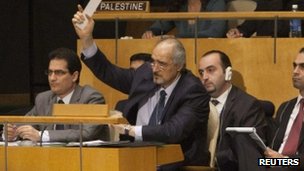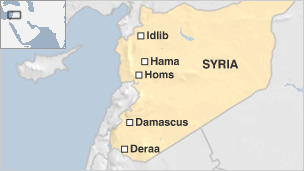Syria crisis: UN assembly adopts Arab-backed resolution
The moment when the UN approved the resolution
The UN General Assembly has voted in favour of a resolution condemning human rights violations in Syria and calling for an end to the violence.
The Arab-backed initiative, which also calls on President Bashar al-Assad to resign, is the latest of several attempts to bring an end to the crisis.
Syria said the move would only worsen the crisis and encourage "terrorists".
Earlier, China said it was sending a senior envoy to Damascus to negotiate a "peaceful and proper" solution.
The non-binding resolution adopted by the General Assembly backs an Arab League plan aimed at stopping the killings. It was modelled on an earlier resolution in the Security Council that was vetoed by Russia and China.
Analysis
The General Assembly was very much a Plan B - the Arab sponsors of the resolution and their Western allies had wanted the legal weight of the Security Council backing their political plan to end Syria's crisis.
But with the Council blocked by Russian and Chinese vetoes, they turned to what is in effect the "world's parliament," hoping that a non-binding endorsement from the 193-member body would lend moral and political clout to their initiative. They hailed the strong majority vote as a clear message of international support to the Syrian people and a demonstration that Bashar al-Assad had never been more isolated.
But there was no disguising that the major powers are as deeply divided as ever. Russia continued to argue that the text was unbalanced, because it made no specific demands of the armed opposition and attempted to sideline the Syrian leadership.
Even some countries which voted yes said Russia had a point (these issues will have to be addressed sooner or later, said Serbia; India said much the same). But in the meantime the impasse continues, which suggests diplomacy will increasingly look elsewhere for a solution, and the violence in Syria will probably get worse.
Unlike its precursor, the resolution endorsed by the assembly has no legal authority, but the BBC's Barbara Plett, at the UN, said its backers hope it would increase political pressure on Damascus to end the violence.
'Promoting civil war'Egypt introduced the resolution to the chamber and urged delegates to reach a consensus which would send a strong message to the Syrian authorities.
"We demand that the Syrian government heed the demands of the Arab and Syrian people and staunch the bloodshed," said deputy ambassador Osama Abdelkhalek.
But Syria's ambassador Bashar Jaafari said a yes vote would only be a message of support to the "extremists and terrorists" Damascus declares it is fighting.
Mr Jaafari said the resolution "would only lead to a tightening of the crisis, and more violence in the region as a whole".
As expected, China and Russia again voted against the measure. Both have firmly opposed what they see as forced regime change and have raised concerns about the possibility of international military involvement.
Before the vote, Russia's Deputy Foreign Minister Gennady Gatilov said the resolution was "unbalanced" so Moscow would not back it.
The countries which voted No
- Belarus
- Bolivia
- China
- Cuba
- Ecuador
- Iran
- Nicaragua
- North Korea
- Russia
- Syria
- Venezuela
- Zimbabwe
"It directs all the demands at the government, and says nothing about the opposition," Russian media quoted him as saying.
Venezuela, which also voted no, said the motion denied Syria its sovereignty and was being used by some parties to "promote a civil war on a large scale".
The resolution was approved by 137 votes to 12 against, with 17 abstentions. Vetoes are not allowed in the assembly. Three countries said technical problems prevented them from voting.
The US voted in favour, with ambassador Susan Rice saying it "sent a clear message to the people of Syria - the world is with you".
"An overwhelming majority of UN member states have backed the plan put forward by the Arab League to end the suffering of Syrians," she said. "Bashar al-Assad has never been more isolated."
Massacre fearsEarlier in the day, UN Secretary General Ban Ki-moon had called on Syrian authorities to stop killing civilians, and said crimes against humanity might be taking place in the country.
 Syria's ambassador Bashar Jaafari
said the vote would make the violence worse
Syria's ambassador Bashar Jaafari
said the vote would make the violence worse "We see neighbourhoods shelled indiscriminately, hospitals used as torture centres, children as young as 10 years old killed and abused. We see almost certain crimes against humanity," he said.
Mr Ban said the previous vetoes were "regrettable", but that the lack of agreement "does not give the government licence to continue this assault on its own people".
Chinese Deputy Foreign Minister Zhai Jun, who will go to Damascus on Friday, condemned violence against civilians and called for the government to respect the people's "legitimate" desire for reform.
But in the interview, posted on the Chinese foreign ministry website, he also said sanctions or the threat of sanctions were "not conducive to the appropriate resolution of this issue".
A Chinese foreign ministry spokesman would not say if Mr Zhai would also meet Syrian opposition representatives during the two-day visit.
Last week, Mr Zhai met a Syrian opposition delegation in Beijing.

In Syria itself, at least 40 people were killed on Thursday, activists said.
Government forces are reported to have launched a new attack on the town of Deraa in the south of the country, where the rebellion first began.
The London-based Syrian Observatory for Human Rights said there were fears of a massacre in the Deraa province village of Sahm al-Julan, where dozens of civilians had disappeared.
"Witnesses said security forces shot at the civilians and then piled them onto pick-up trucks. Their fate is unknown," the group said in a statement.
There are also reports of violence on the eastern border with Iraq, and in Kfar Nabuda in the central Hama province, where a number of rebel soldiers are reported to have been killed, along with several civilians.
Shelling by government forces was reported in Homs, which has along with Hama been hit by major government offensives.
There were also reports that prominent pro-democracy blogger Razan Ghazzawi had been arrested, along with Mazen Darwish, head of the Syrian Centre for Media and Freedom Of Expression, and a dozen other people.
Restrictions on journalists mean such reports are difficult to verify.
Human rights groups say 7,000 civilians have been killed in Syria since the uprising against Mr Assad began last March.
BBC © 2012 The BBC is not responsible for the content of external sites. Read more.
